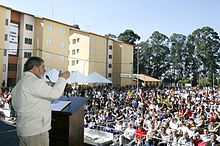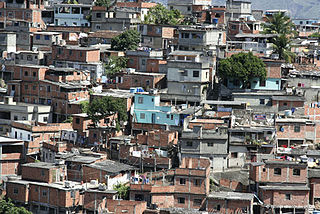Bolsa Família

Bolsa Família is a social welfare program of the Brazilian government. The program attempts to both reduce short-term poverty by direct cash transfers and fight long-term poverty by increasing human capital among the poor through conditional cash transfers. It also works to give free education to children who cannot afford to go to school to show the importance of education. [2] The part of the program that is about direct welfare benefits could perhaps best be described as a basic income with some prerequisites. Families with children, to be eligible for the income, must ensure that their children attend school and have been vaccinated. The Bolsa Familia program has been mentioned as one factor contributing to the reduction of poverty in Brazil, which fell 27.7% during the first term in the Lula administration. [3] About 12 million Brazilian families receive funds from Bolsa Família, [4] which has been described as "the largest programme of its kind in the world." [4] By February 2011, 26% of the Brazilian population were covered by the program. [5] As of March 2020, the program covers 13.8 million families, and pays an average of $34 per month, in a country where the minimum wage is $190 per month. [6]
The reaction from multilateral institutions to Bolsa Família has generally been enthusiastic. During a trip to Brazil in 2005, the former president of the World Bank, Paul Wolfowitz said, "Bolsa Familia has already become a highly praised model of effective social policy. Countries around the world are drawing lessons from Brazil’s experience and are trying to produce the same results for their own people." [7] Economic thinker and philosopher Joseph Heath praised the program in his 2010 book Economics without Illusions , citing it as an example of how to manage incentives of people whose poverty results from hyperbolic discounting. Heath wrote, "What makes programs such as this so successful is that they do not change people's incentives: They merely rearrange the temporal sequence in which these incentives are experienced. ... This has proven to be more valuable than a thousand recitations of the fable of the ant and the grasshopper." [8]
Criticism
However, the program is far from being universally accepted by Brazilian society. Among the various criticisms it receives, one of the most recurrent is the assertion that it could discourage the search for employment, encouraging laziness of people. Under this premise, many people would give up trying to find a job, content, instead, to live on the Bolsa Família program. [9] [10] The Catholic Church, through its powerful National Conference of Bishops of Brazil (CNBB), maintains [11] [12] that "the program is addictive" and leads its beneficiaries to an "accommodation".
This, however, is not what the World Bank finds. Having conducted several surveys on the subject, the World Bank came to the conclusion that the program does not discourage work, nor social ascension. On the contrary, says Bénédicte de la Brière, responsible for the program monitoring at the institution: "Adult work is not impacted by income transfers. In some cases adults will even work harder because having this safety net encourages them to assume greater risks in their activities". [13]
Another criticism of the program is the fact that it is perceived by opponents of the currently ruling party as a program meant to "buy" votes of poor people, creating clientism.
Surveys and research
Surveys conducted by the Federal Government among Bolsa Família's beneficiaries indicate that the money is spent, in order of priority, on food; school supplies; clothing; and shoes. [14] A study conducted by The Federal University of Pernambuco, using sophisticated statistical methods, inferred that 87% of the money is used, by families living in rural areas, to buy food. [15]
According to research promoted by some universities and the Brazilian Institute of Geography and Statistics (IBGE) the program has clearly contributed to Brazil's recent improvements in its fight against poverty. An ex ante econometric evaluation of Bolsa Escola did find significant effects on both school attendance rates and the number of children involved in child labor. [16] [17]
The World Bank, which provided a loan to assist the Brazilian government in managing the Bolsa Família Program, [18] declares that "Although the program is relatively young, some results are already apparent, including: (...) contributions to improved education outcomes, and impacts on children’s growth, food consumption, and diet quality". [19]
A study by the UNDP's International Policy Centre for Inclusive Growth [20] found that over 80% of the Bolsa Familia benefits go to families in poverty (making under half the minimum wage per capita), thus most of the benefits go to the poor. Bolsa Familia was also found to have been responsible for about 20% of the drop in inequality in Brazil since 2001, which is welcome in one of the most unequal countries on the planet. [21] Research promoted by the World Bank shows a significant reduction in child labor exploitation among children benefited by the Bolsa Família program. [22]
One positive effect of the program which is not immediately apparent is that it makes a significant impact on the ability of the poorest families to eat. Children in public schools receive one free meal a day—two in the poorest areas—and so less of their family's limited income is needed to pay for food. In a survey of Bolsa Familia recipients, 82.4% reported eating better; additionally, it was reported to increase the incomes of the poorer families by about 25%.











